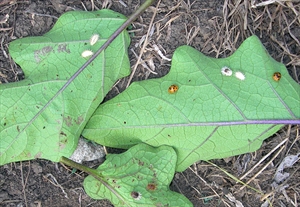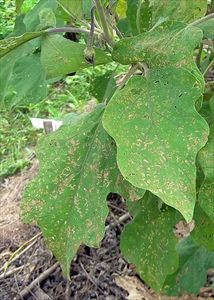- Widespread distribution. Asia, South America, Oceania. Different types feed on eggplant, beans, cucumber, maize, weeds.
- Eggs in groups of 10-20 on underside of leaves. Larvae graze underside of leaves; adults feed on both sides, often making holes. Adults with stiff hairs on upper surface, unlike beneficial ladybird beetles.
- Natural enemies: parasitoid wasps.
- Cultural control: avoid planting near older infected crops; hand pick larvae if number is small; weed; collect and burn trash after harvest.
- Chemical control: use wood ash mixed with lime (50:50); PDPs: chilli, derris, neem, or pyrethrum; or synthetic pyrethroids, but likely to kill natural enemies.









